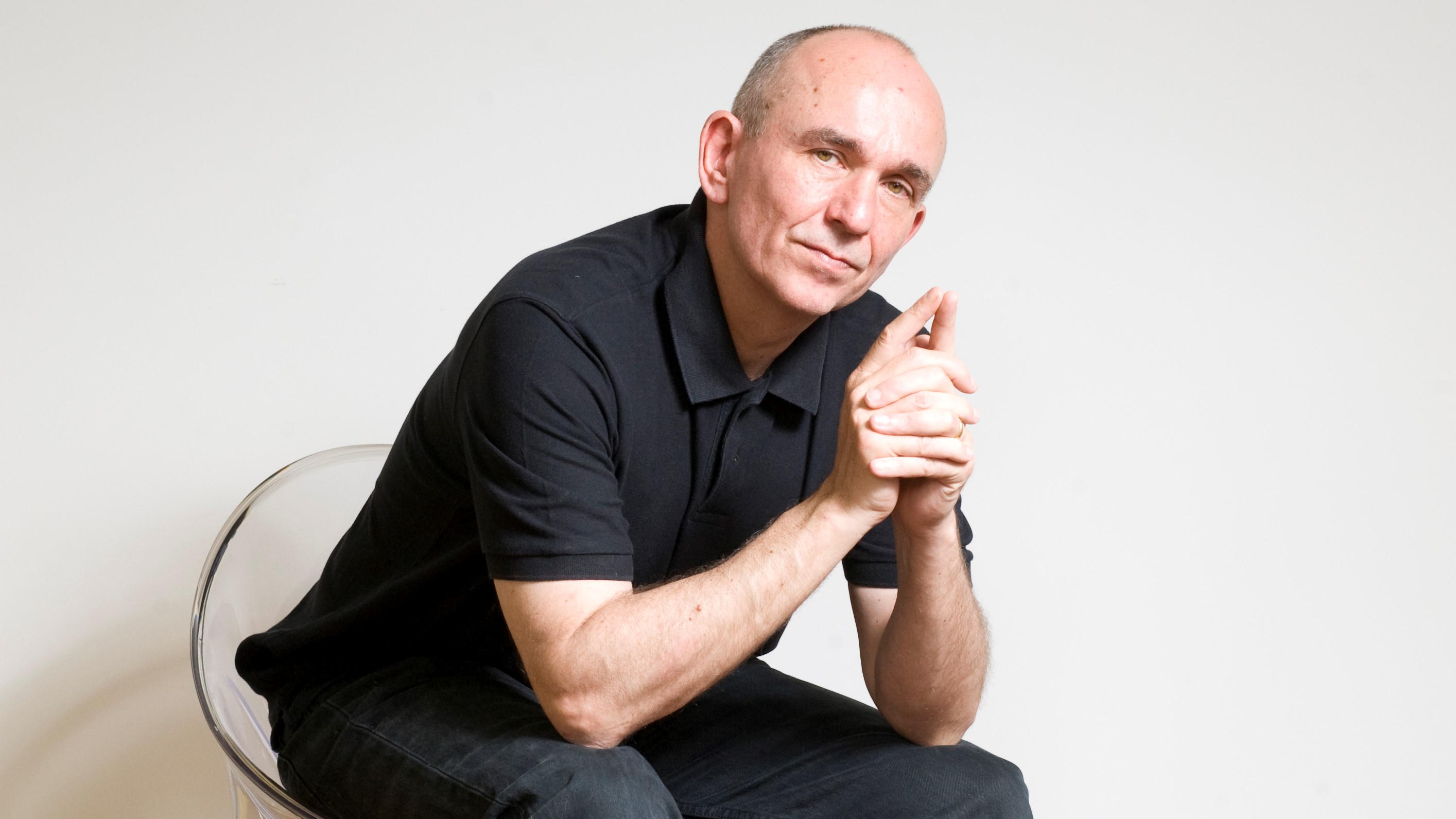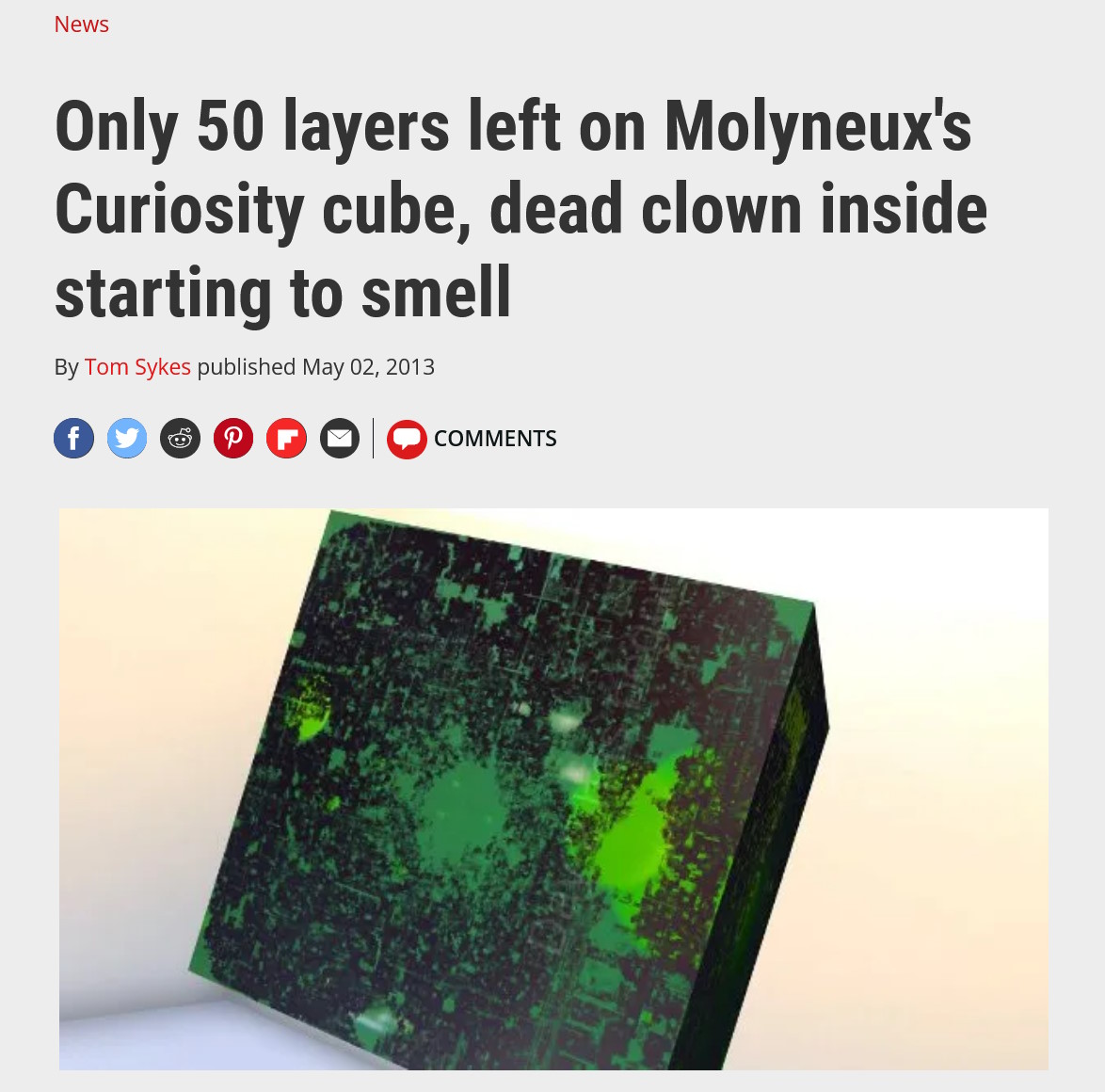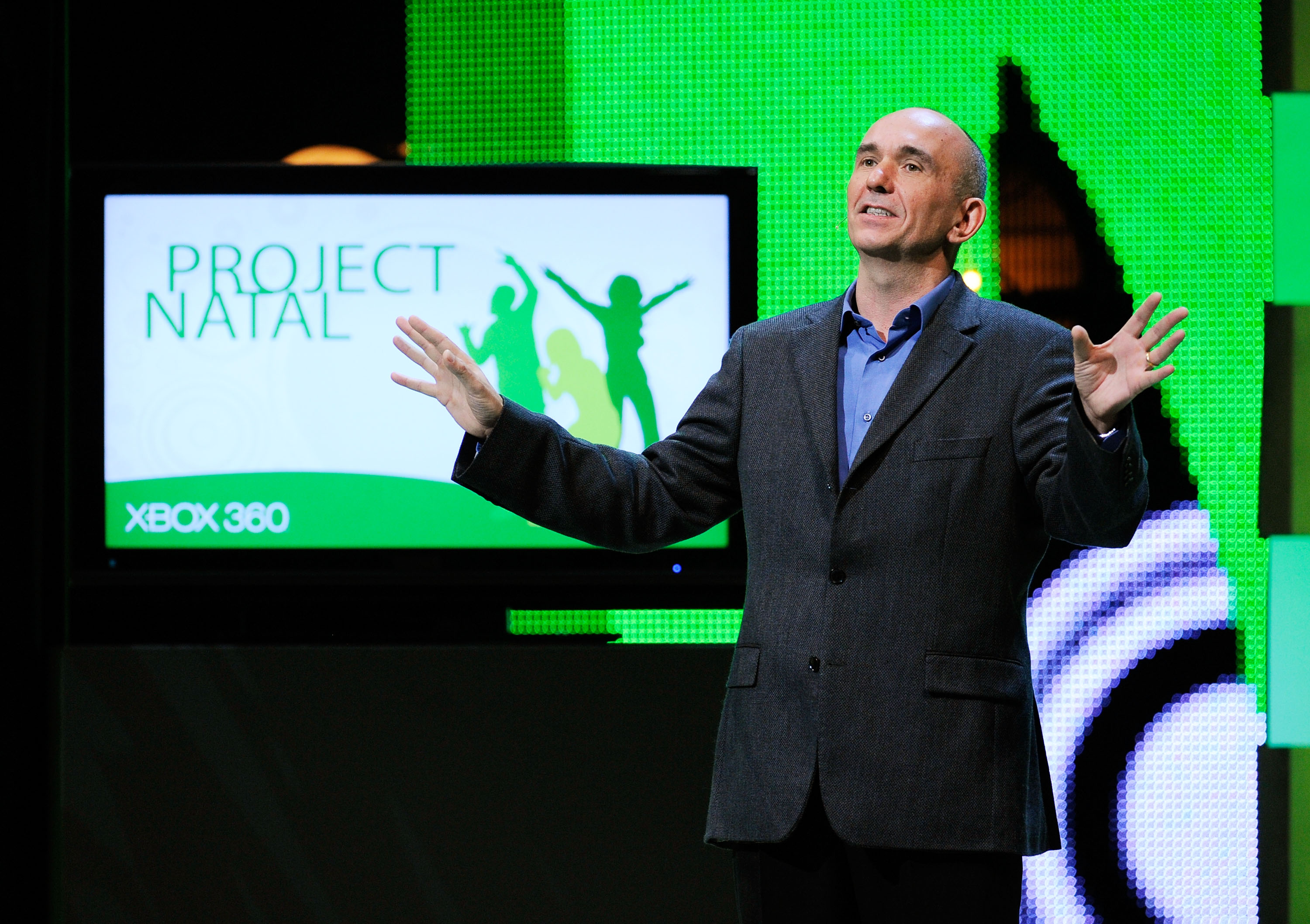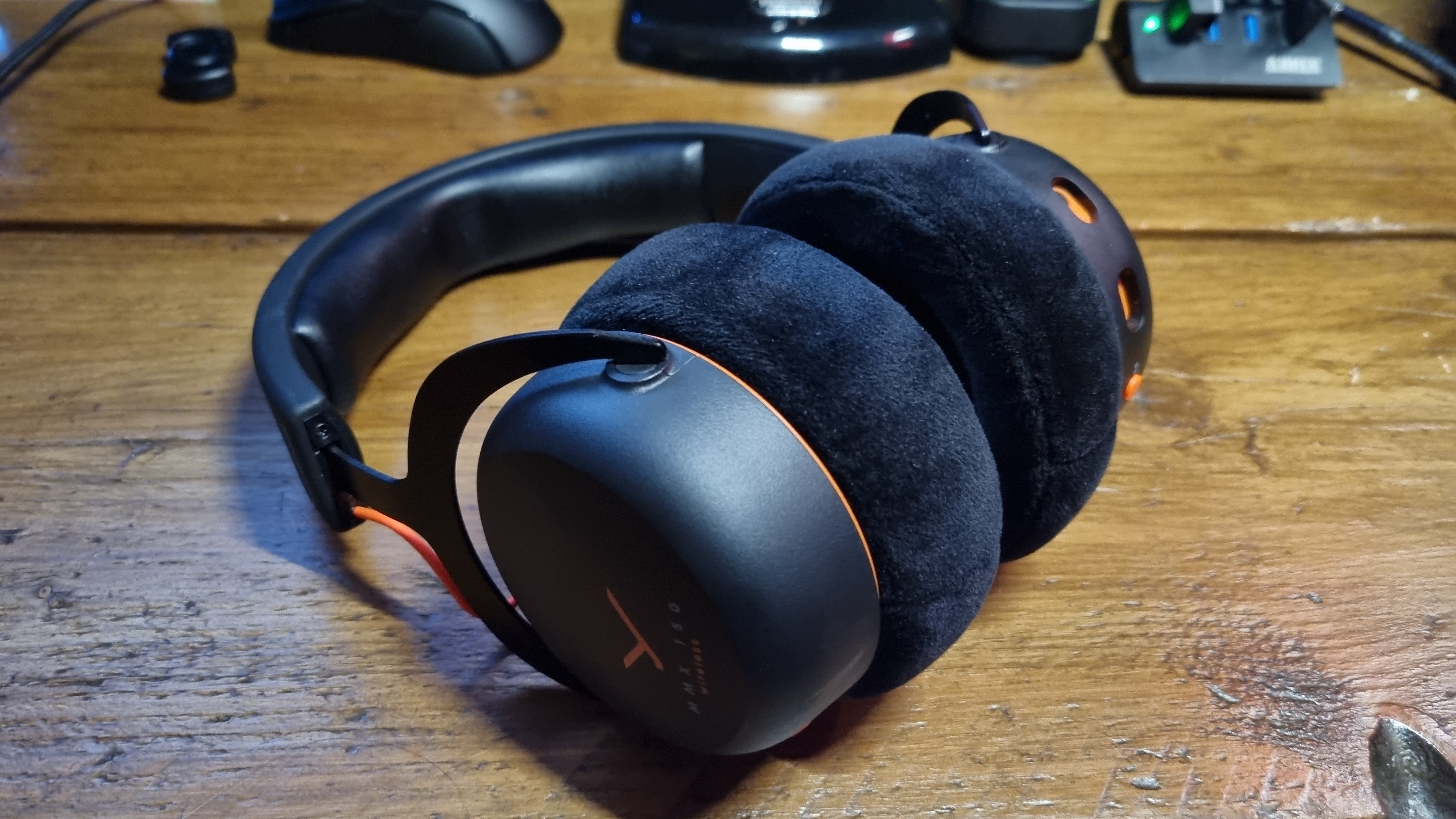Peter Molyneux says 'We never took a penny of money from people' with his cursed cube game, contradicting Peter Molyneux who said it had made 'a few tens of thousands' in 2013
Okay, Peter. Sure thing, Peter.

Keep up to date with the most important stories and the best deals, as picked by the PC Gamer team.
You are now subscribed
Your newsletter sign-up was successful
Want to add more newsletters?

Every Friday
GamesRadar+
Your weekly update on everything you could ever want to know about the games you already love, games we know you're going to love in the near future, and tales from the communities that surround them.

Every Thursday
GTA 6 O'clock
Our special GTA 6 newsletter, with breaking news, insider info, and rumor analysis from the award-winning GTA 6 O'clock experts.

Every Friday
Knowledge
From the creators of Edge: A weekly videogame industry newsletter with analysis from expert writers, guidance from professionals, and insight into what's on the horizon.

Every Thursday
The Setup
Hardware nerds unite, sign up to our free tech newsletter for a weekly digest of the hottest new tech, the latest gadgets on the test bench, and much more.

Every Wednesday
Switch 2 Spotlight
Sign up to our new Switch 2 newsletter, where we bring you the latest talking points on Nintendo's new console each week, bring you up to date on the news, and recommend what games to play.

Every Saturday
The Watchlist
Subscribe for a weekly digest of the movie and TV news that matters, direct to your inbox. From first-look trailers, interviews, reviews and explainers, we've got you covered.

Once a month
SFX
Get sneak previews, exclusive competitions and details of special events each month!
Peter Molyneux, founder of Bullfrog and Lionhead Studios, is notorious for overhyping his games. Back in the day, when I was a lot younger than I am now, this was considered a kind of adorable foible—the guy just got so excited about the stuff he was making he couldn't help but make wild, unfulfillable promises about them.
That perception dramatically changed, I reckon, around the time of massively multiplayer Curiosity: What's Inside The Cube. It was a game in which, well, a lot of players all tapped on a cube, removing layer after layer until they eventually hit the centre. Molyneux promised the prize for the single player who reached that centre would be "life-changing".
It turned out to be the role of 'God of gods' in Molyneux's then-upcoming game Godus, plus 1% of the game's revenue. The winner—an 18-year-old named Bryan Henderson—never got any money, and told Eurogamer that he was largely forgotten by Molyneux's studio after a single visit to its office in 2015.
Fast forward to today, and an interview with the most recent issue of Edge magazine, and Molyneux seems contrite about the whole saga, but I don't know that he's learnt the right lessons. Molyneux frames the game as a social experiment more than a money-making exercise, and says that—if he had his time again—he would "love to go back and put inside the cube something graphical, nothing more than that."
And then, like a lemming who simply cannot resist an especially steep cliff, he muses that "In fact, if you were to go back, what you would give, now, would be a cryptocurrency thing. And if it was launched back then [2012], in the early days of cryptocurrency, it'd probably be worth a fortune now."
Somehow, I doubt that jamming crypto into the Curiosity cube would have made the whole sorry saga any better, but Molyneux will Molyneux, and this is, after all, the man whose very next game after Godus was some benighted NFT thing.
Either way, Molyneux regrets his verbiage at the time. "I shouldn't have said 'life-changing'—I should have said there's something 'amazing,' and I think the experiment would have worked just as well."
Keep up to date with the most important stories and the best deals, as picked by the PC Gamer team.
Though, just speaking personally, I don't think it would have been any more true. A grand total of no money and a honcho role in an unsuccessful game you can no longer purchase isn't much to write home about.
Perhaps the strangest part of Molyneux's recollection of the Curiosity/Godus debacle relates to its microtransactions, though. "The other thing I wanted to work out was monetisation. I made this horrendous mistake. I said, 'We'll have some addons you can buy to help with the tapping of the cube, but they'll cost £10,000," said Molyneux, who said he was inspired by tales of people spending millions on World of Tanks. Curiosity promised ahead of its launch a mega-chisel DLC that would cost £50,000.
Alas, "That broke [Apple] App Store guidelines, so we had to remove that monetisation. It was only later on that we monetised Curiosity at all." True enough: it was only after launch that Molyneux and co added microtransactions to do things like remove 500,000 bits o' cube without having to tap, or (admittedly, this is quite funny) pay the same amount to add 500,000.
But almost in the same breath, Molyneux defends his record by claiming "We never took a penny of money from people," which is straightforwardly not true. I assume what Molyneux means is that Curiosity didn't bring in a profit, but that's simply not the same thing. In 2013, the man himself told Wired it had generated "a few tens of thousands" in revenue.
So I don't really know that Molyneux has learnt the right lessons from his chequered past in game dev, and I can't say I've got my hopes up for his next—and supposedly final—game, Masters of Albion. Especially when I consider the poor fate of Bryan Henderson, Curiosity's winner.
"It was life-changing for [Henderson]," declared Molyneux. "It came true. He was just a kid, and suddenly everyone wanted to talk to him. But it was a mistake, and I apologise for it. I should never have said 'life-changing'".

1. RTX 5060 laptop | Lenovo LOQ 15 | $810 (save $490)
2. 1 TB SSD | Lexar NM790 | $66 (save $24)
3. Gaming chair | Corsair TC100 Relaxed | $160 (save $110)
4. 4K OLED monitor | MSI MAG | $750 (save $150)
5. GPU | ASRock RX 9070 XT | $640
👉Check out our full list of deals👈

One of Josh's first memories is of playing Quake 2 on the family computer when he was much too young to be doing that, and he's been irreparably game-brained ever since. His writing has been featured in Vice, Fanbyte, and the Financial Times. He'll play pretty much anything, and has written far too much on everything from visual novels to Assassin's Creed. His most profound loves are for CRPGs, immersive sims, and any game whose ambition outstrips its budget. He thinks you're all far too mean about Deus Ex: Invisible War.
You must confirm your public display name before commenting
Please logout and then login again, you will then be prompted to enter your display name.



